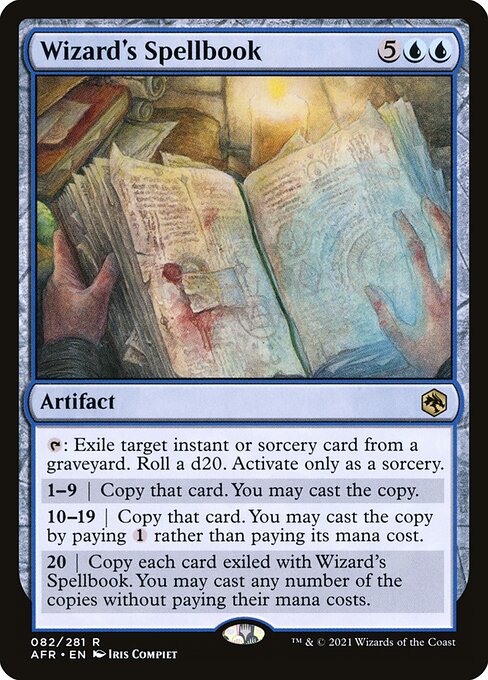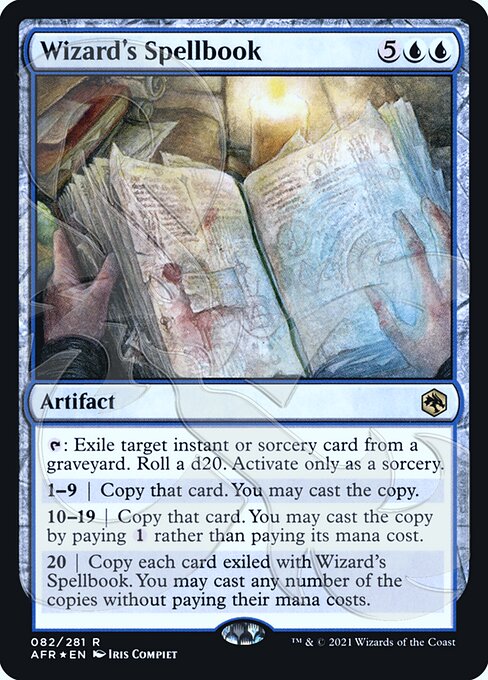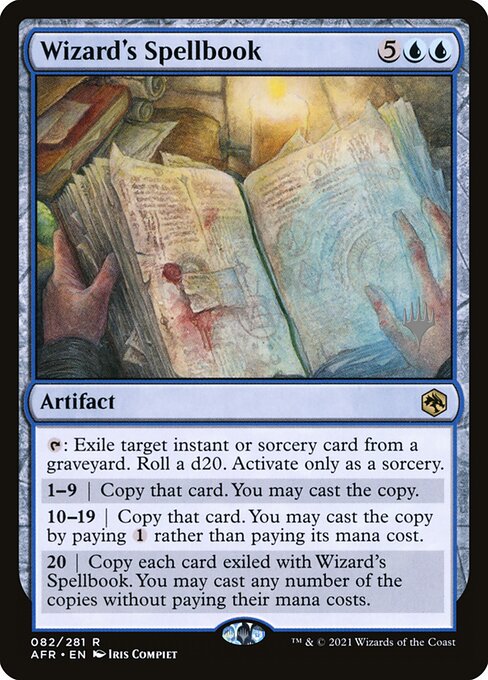Grimoire de magicien
Artefact
: Exilez une carte d'éphémère ou de rituel ciblée d'un cimetière. Lancez un d20. N'activez que lorsque vous pourriez lancer un rituel.
1—9 | Copiez cette carte. Vous pouvez lancer la copie.
10—19 | Copiez cette carte. Vous pouvez lancer la copie en payant à la place de payer son coût de mana.
20 | Copiez chaque carte exilée par le Grimoire de magicien. Vous pouvez lancer n'importe quel nombre de copies sans payer leur coût de mana.
1—9 | Copiez cette carte. Vous pouvez lancer la copie.
10—19 | Copiez cette carte. Vous pouvez lancer la copie en payant à la place de payer son coût de mana.
20 | Copiez chaque carte exilée par le Grimoire de magicien. Vous pouvez lancer n'importe quel nombre de copies sans payer leur coût de mana.
standard
future
historic
gladiator
pioneer
explorer
modern
legacy
pauper
vintage
penny
commander
brawl
alchemy
paupercommander
duel
oldschool
premodern
Rulings
While playing Planechase, rolling the planar die will cause any ability that triggers whenever a player rolls one or more dice to trigger. However, any effect that refers to a numerical result will ignore the rolling of the planar die.
If your result is 10–19, you may pay instead of its mana cost. You cannot pay its regular mana cost or any alternative costs the copy has. You may pay any additional costs and must pay mandatory additional costs.
Some effects may modify the result of a die roll. This may be part of the instruction to roll a die or it may come from other cards. Anything that references the “result” of a die roll is looking for the result after these modifications. Anything that is looking for the “natural result” is looking for the number shown on the face of the die before these modifications.
Dice used must have equally likely outcomes and the roll must be fair. Although physical dice are recommended, digital substitutes are allowed, provided they have the same number of equally likely outcomes as specified in the original roll instruction.
In all cases, any copies you don't cast cease to exist after the ability is finished resolving.
Some abilities, like that of Pixie Guide and Barbarian Class, replace rolling a die with rolling extra dice and ignoring the lowest roll. The ignored rolls are not considered for the effect that instructed you to roll a die, and do not cause abilities to trigger. For all intents and purposes, once you determine which dice count, any extra dice were never rolled.
Tournament events have more specific rules regarding dice and die-rolling. For more information, please see the most recent version of the Magic Tournament Rules at https://wpn.wizards.com/en/document/magic-gathering-tournament-rules.
The instruction to roll a die and the effect that occurs because of the result are all part of the same ability. Players do not get the chance to respond to the ability after knowing the result of the roll.
If your result is 1–9, you must still pay all costs to cast the copy. You may pay any additional or alternative costs the spell has. If it has any mandatory additional costs, those must be paid.
An effect that says “choose a target, then roll a d20” or similar still uses the normal process of putting an ability on the stack and resolving it. Choosing targets is part of putting the ability on the stack and rolling the d20 happens later, as the ability resolves.
Some effects instruct you to roll again. This uses the same number and type of dice as the original roll, and that roll will use the same set of possible outcomes.
An ability that tells you to roll a die will also specify what to do with the result of that roll. Most often, this is in the form of a “results table” in the card text.
If your result is 20, you may cast the copies without paying their mana costs. You cannot pay their regular mana costs or any alternative costs the copies have. You may pay any additional costs and must pay mandatory additional costs. You may cast the copies in any order you choose.
Dice are identified by the number of faces each one has. For example, a d20 is a twenty-sided die.
If you control multiple copies of Wizard's Spellbook, each one tracks the cards it has exiled separately.
If your result is 10–19, you may pay instead of its mana cost. You cannot pay its regular mana cost or any alternative costs the copy has. You may pay any additional costs and must pay mandatory additional costs.
Some effects may modify the result of a die roll. This may be part of the instruction to roll a die or it may come from other cards. Anything that references the “result” of a die roll is looking for the result after these modifications. Anything that is looking for the “natural result” is looking for the number shown on the face of the die before these modifications.
Dice used must have equally likely outcomes and the roll must be fair. Although physical dice are recommended, digital substitutes are allowed, provided they have the same number of equally likely outcomes as specified in the original roll instruction.
In all cases, any copies you don't cast cease to exist after the ability is finished resolving.
Some abilities, like that of Pixie Guide and Barbarian Class, replace rolling a die with rolling extra dice and ignoring the lowest roll. The ignored rolls are not considered for the effect that instructed you to roll a die, and do not cause abilities to trigger. For all intents and purposes, once you determine which dice count, any extra dice were never rolled.
Tournament events have more specific rules regarding dice and die-rolling. For more information, please see the most recent version of the Magic Tournament Rules at https://wpn.wizards.com/en/document/magic-gathering-tournament-rules.
The instruction to roll a die and the effect that occurs because of the result are all part of the same ability. Players do not get the chance to respond to the ability after knowing the result of the roll.
If your result is 1–9, you must still pay all costs to cast the copy. You may pay any additional or alternative costs the spell has. If it has any mandatory additional costs, those must be paid.
An effect that says “choose a target, then roll a d20” or similar still uses the normal process of putting an ability on the stack and resolving it. Choosing targets is part of putting the ability on the stack and rolling the d20 happens later, as the ability resolves.
Some effects instruct you to roll again. This uses the same number and type of dice as the original roll, and that roll will use the same set of possible outcomes.
An ability that tells you to roll a die will also specify what to do with the result of that roll. Most often, this is in the form of a “results table” in the card text.
If your result is 20, you may cast the copies without paying their mana costs. You cannot pay their regular mana costs or any alternative costs the copies have. You may pay any additional costs and must pay mandatory additional costs. You may cast the copies in any order you choose.
Dice are identified by the number of faces each one has. For example, a d20 is a twenty-sided die.
If you control multiple copies of Wizard's Spellbook, each one tracks the cards it has exiled separately.
Rulings
While playing Planechase, rolling the planar die will cause any ability that triggers whenever a player rolls one or more dice to trigger. However, any effect that refers to a numerical result will ignore the rolling of the planar die.
If your result is 10–19, you may pay instead of its mana cost. You cannot pay its regular mana cost or any alternative costs the copy has. You may pay any additional costs and must pay mandatory additional costs.
Some effects may modify the result of a die roll. This may be part of the instruction to roll a die or it may come from other cards. Anything that references the “result” of a die roll is looking for the result after these modifications. Anything that is looking for the “natural result” is looking for the number shown on the face of the die before these modifications.
Dice used must have equally likely outcomes and the roll must be fair. Although physical dice are recommended, digital substitutes are allowed, provided they have the same number of equally likely outcomes as specified in the original roll instruction.
In all cases, any copies you don't cast cease to exist after the ability is finished resolving.
Some abilities, like that of Pixie Guide and Barbarian Class, replace rolling a die with rolling extra dice and ignoring the lowest roll. The ignored rolls are not considered for the effect that instructed you to roll a die, and do not cause abilities to trigger. For all intents and purposes, once you determine which dice count, any extra dice were never rolled.
Tournament events have more specific rules regarding dice and die-rolling. For more information, please see the most recent version of the Magic Tournament Rules at https://wpn.wizards.com/en/document/magic-gathering-tournament-rules.
The instruction to roll a die and the effect that occurs because of the result are all part of the same ability. Players do not get the chance to respond to the ability after knowing the result of the roll.
If your result is 1–9, you must still pay all costs to cast the copy. You may pay any additional or alternative costs the spell has. If it has any mandatory additional costs, those must be paid.
An effect that says “choose a target, then roll a d20” or similar still uses the normal process of putting an ability on the stack and resolving it. Choosing targets is part of putting the ability on the stack and rolling the d20 happens later, as the ability resolves.
Some effects instruct you to roll again. This uses the same number and type of dice as the original roll, and that roll will use the same set of possible outcomes.
An ability that tells you to roll a die will also specify what to do with the result of that roll. Most often, this is in the form of a “results table” in the card text.
If your result is 20, you may cast the copies without paying their mana costs. You cannot pay their regular mana costs or any alternative costs the copies have. You may pay any additional costs and must pay mandatory additional costs. You may cast the copies in any order you choose.
Dice are identified by the number of faces each one has. For example, a d20 is a twenty-sided die.
If you control multiple copies of Wizard's Spellbook, each one tracks the cards it has exiled separately.
If your result is 10–19, you may pay instead of its mana cost. You cannot pay its regular mana cost or any alternative costs the copy has. You may pay any additional costs and must pay mandatory additional costs.
Some effects may modify the result of a die roll. This may be part of the instruction to roll a die or it may come from other cards. Anything that references the “result” of a die roll is looking for the result after these modifications. Anything that is looking for the “natural result” is looking for the number shown on the face of the die before these modifications.
Dice used must have equally likely outcomes and the roll must be fair. Although physical dice are recommended, digital substitutes are allowed, provided they have the same number of equally likely outcomes as specified in the original roll instruction.
In all cases, any copies you don't cast cease to exist after the ability is finished resolving.
Some abilities, like that of Pixie Guide and Barbarian Class, replace rolling a die with rolling extra dice and ignoring the lowest roll. The ignored rolls are not considered for the effect that instructed you to roll a die, and do not cause abilities to trigger. For all intents and purposes, once you determine which dice count, any extra dice were never rolled.
Tournament events have more specific rules regarding dice and die-rolling. For more information, please see the most recent version of the Magic Tournament Rules at https://wpn.wizards.com/en/document/magic-gathering-tournament-rules.
The instruction to roll a die and the effect that occurs because of the result are all part of the same ability. Players do not get the chance to respond to the ability after knowing the result of the roll.
If your result is 1–9, you must still pay all costs to cast the copy. You may pay any additional or alternative costs the spell has. If it has any mandatory additional costs, those must be paid.
An effect that says “choose a target, then roll a d20” or similar still uses the normal process of putting an ability on the stack and resolving it. Choosing targets is part of putting the ability on the stack and rolling the d20 happens later, as the ability resolves.
Some effects instruct you to roll again. This uses the same number and type of dice as the original roll, and that roll will use the same set of possible outcomes.
An ability that tells you to roll a die will also specify what to do with the result of that roll. Most often, this is in the form of a “results table” in the card text.
If your result is 20, you may cast the copies without paying their mana costs. You cannot pay their regular mana costs or any alternative costs the copies have. You may pay any additional costs and must pay mandatory additional costs. You may cast the copies in any order you choose.
Dice are identified by the number of faces each one has. For example, a d20 is a twenty-sided die.
If you control multiple copies of Wizard's Spellbook, each one tracks the cards it has exiled separately.
Votre collection ? vos decks ?
Envie de gérer votre collection et/ou créer des decks ?
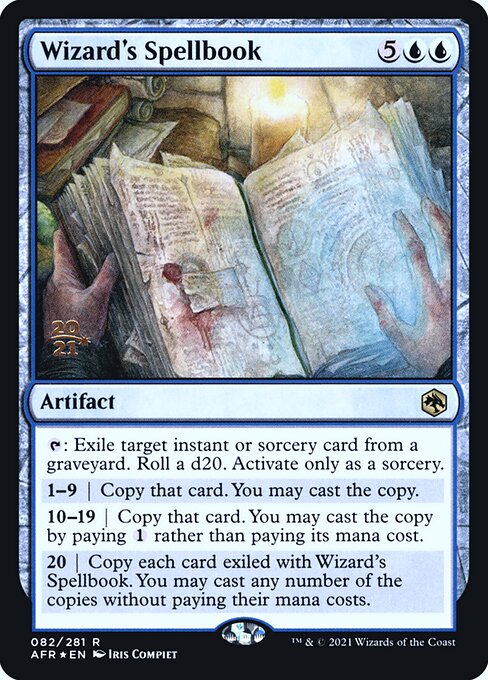

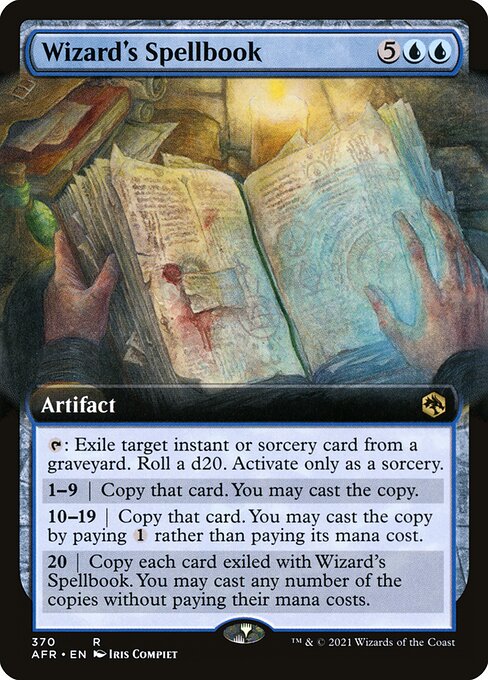
 0
0
 0.27€
0.27€
